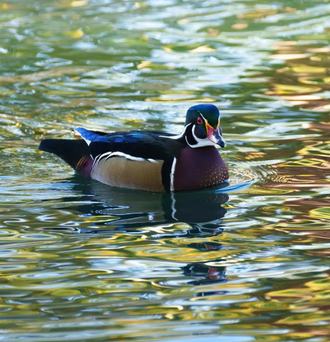
TUCSON — Twelve birdwatchers walk into a park and focus their binoculars on a vermillion flycatcher. Nearby a Gila woodpecker knock knocks on a palm tree as if waiting for something to respond, "who's there?"
It's early morning on the last Saturday before early ballots are due to be posted in the mail for the midterm elections, and these birder volunteers are not joking around.
Their organizer, David Robinson, sidles up to a picnic table and serves up loaner binoculars to late arrivals while arranging canvassing materials under the canopy of Ramada 22 at Reid Park.
Robinson has been working as a conservation advocate staffer with the Tucson Audubon Society for a year, and birding since he was a kid. During the 2000 election, he started merging his interests in birding and voting. And in 2020, he formed a grassroots campaign to increase voter turnout called "Auk the Vote," a play on the "Rock the Vote" activism phrase using the name of a large, flightless bird in the puffin family called the Great Auk, which went extinct in 1844.
"You have to fight for your joy," Robinson said. "You're being selfish if, at this point in time, you go out and enjoy the birds and don't get involved in trying to protect them."
On this crisp but sunny fall morning, he's hosting an event put on jointly by the Tucson Audubon Society and the Environmental Voter Project. As a whole, the Audubon Society has a history of being totally apolitical, he said. The Tucson branch is one of the only chapters that is doing anything related to elections.
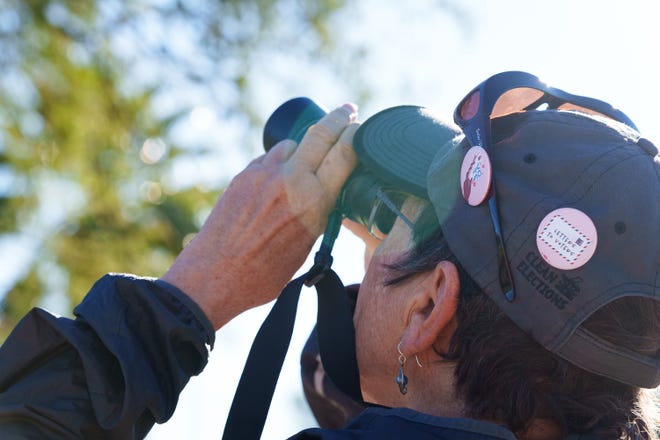
They're aided from afar by the data chops of Nathaniel Stinnett, founder of the Environmental Voter Project. He uses public records to identify already registered voters in 17 states who, based on other data points, like the purchase of electric vehicles or subscriptions to outdoor magazines, are likely to support environmental causes, but who have never cast a ballot in a midterm election. In Arizona, this describes a potential cache of nearly 250,000 voters, Stinnett said, which could be enough to "green" the results of a midterm.
"I started to realize in a lot of polling data that, even though there were very few voters who listed climate as a top priority, there were tons of non-voters who listed climate as a top priority," Stinnett said. "That’s where the potential political power of the environmental movement is, and someone has to go after them."
Both organizations are strictly nonpartisan, as was Saturday's event. But the alarm call raised by the 2022 State of the Birds report, released Oct. 12 by a coalition of 29 government agencies, private organizations and bird-focused groups known collectively as the North American Bird Conservation Initiative, has flushed avian-enthusiasts out of hiding and into action.
The report found that birds are in steep decline throughout the U.S. and Canada in every habitat except wetlands, where decades of successful conservation efforts have kept populations afloat. Adding to concerns raised by the 2019 version, which reported a loss of 3 billion North American birds since 1970, the 2022 study documented decreases in populations of half of U.S. bird species over the past 50 years, with losses peaking at 34% for grassland birds and 50% for 70 tipping point species identified as being at risk of further decline.
Climate change is a leading force pushing winged wildlife to the brink. The higher temperatures and worsened storms caused by humans burning fossil fuels for energy add stress to birds trying to travel, eat, drink and nest in altered habitats.
Other ways humans have built up society make it seem almost as if the near-total destruction of avian species was by design. Around the world, large numbers of birds die each year from flying into windows, ingesting pesticides, loss of habitat to development, mining, logging or agricultural conversion, or at the claws of outdoor cats.
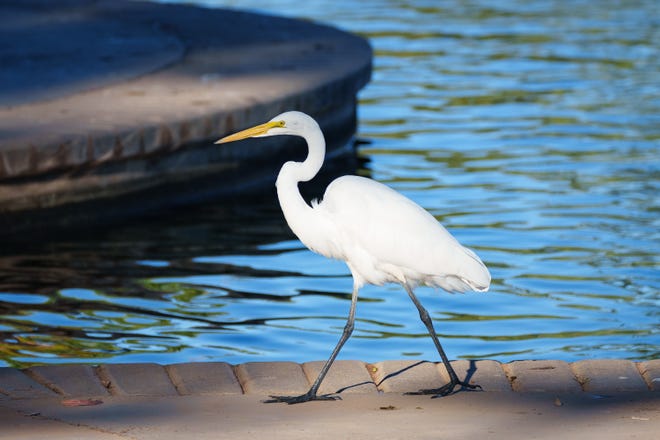
The Fall 2022 issue of Tucson Audubon's Vermillion Flycatcher magazine summarizes risks to birds of projects in Arizona that hinge on political support: The proposed Interstate 11 would affect three species; mining projects could place seven species at risk; ongoing cattle grazing threatens two species of birds; and the proposed Villages at Vigneto mega-development and Sunzia transmission line would damage habitat important for three and five different species of birds, respectively.
And, though this year's Arizona ballot offers no opportunities to vote specifically for or against these projects or to address wildlife conservation or even climate change, the talon-ted naturalists who flocked to Reid Park on Saturday did so with a Gilded flicker of hope that keeping environmental voters engaged in the democratic process may help stymie the further hemorrhaging of bird biodiversity in future elections.
Flushing the vote
After scoping mallards, American wigeon and ring-necked ducks at the Reid Park pond, a black-crowned night heron snoozing in the oak tree rooted on its opposite bank and an unidentified hummingbird zooming overhead, the birder voters returned to meet with Robinson for instructions on how to canvass.
Standing in a circle, they each introduced themselves, as is common, in tern.
Laura Couchman is a long-time volunteer with the Tucson Audubon Society and feels strongly that Arizona is "a super important state for birding and for voting." Matt Vandzura, a former ranger at both Grand Canyon National Park and Organ Pipe Cactus National Monument, retired to Tucson a year ago specifically for its acclaimed birding, the activity that introduced him to his wife.
Steve Hamilton moved from Alaska, where he worked on a sea ferry, which he said used to have a naturalist employed on board to teach people about birds, "until a Republican governor got in office and decided the public ferry system should make money."
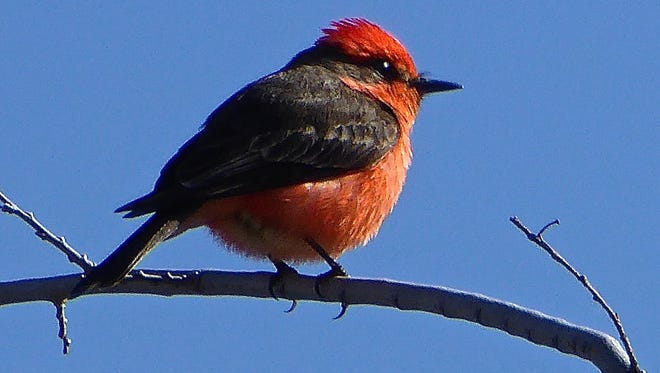
Aamir Farooq heard about the event through Citizens Climate Lobby and is so committed to mobilizing voters in close elections that he took the train from Los Angeles that morning to join the effort, which he followed with another canvassing event that afternoon. He used to live in Scottsdale and said that since the Jan. 6 assault on the capitol, he just can't stand to watch the country spiral into chaos.
As Tucson local and experienced canvasser Kathleen Dubbs introduced herself, a Cooper's hawk flew overhead and the volunteers paused to watch it land in a tall pine tree. Milly Lierman had to speak up above the din of alarmed house finches to share her sentiment that "it seems like stewardship of the Earth would be an issue that unites us and we could agree we should spend time and money and effort now."
After introductions were complete, Robinson handed out clipboards with names and addresses of registered voters within walking distance that Stinnett's algorithm had suggested would vote on behalf of birds if they made it to the polls. The gold standard would be to get those people to verbalize a plan to vote and to join the EVP's mailing list for reminders about upcoming elections. He warned the birders not to get involved in political debates, to steer clear of aggressive dogs and to avoid placing anything into mail boxes, which would be ill-eagle.
Then, on a wing and a prayer, the volunteers paired up (toucan do more than one) and fanned out into the neighborhood, not to change minds but to reinforce habits.
As Stinnett explained over the phone, the goal of EVP is to use lessons from behavioral science to encourage people to boost their good voting record rather than shaming them for past absences. It takes advantage of a psychological phenomenon called "loss aversion," which is the idea that people worry more about losing $5 than they get excited about finding $5.
The canvassing philosophy also draws upon findings that drivers are more likely to curb their speed when an automated sign flashes a frowning face at them than a "slow down" command. Don't tell people what to do or how to do it, Stinnett theorized. Instead, go to someone's door and ask them with a smile if they have a plan to vote.
"It's equating the act of voting with whether you’re someone who follows through on your promises or not," Stinnett said. "Now is that a little manipulative? Yes. But the climate crisis is a pretty big problem and there are millions of environmentalists who don’t vote."
Trick-or-tweeting for democracy
Seasoned canvassers and local engineers Carissa Sipp and Dan Hunt began their migration south from Reid Park to Beverly Street with their 13-year-old blind dog, Bear, and their two trailing ducklings, Alessandra, 10, and Everest, 8, in tow.
"I'm really political because it matters so much to my girls," Sipp said, while walking to the first on their list of 21 houses. "Our kids are so in love with birds and we're just screwing up (the planet). We're screwing it up for profit."
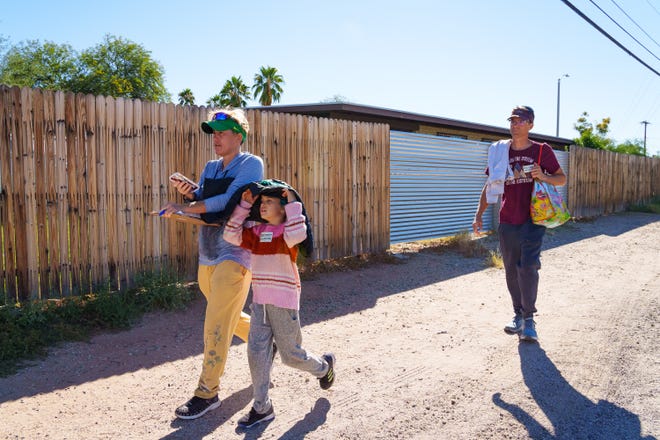
She sees birding and canvassing as activities that create community and connect her daughters to their world. She thinks adults are also more likely to vote when they feel part of a community.
They located the home of an 85-year-old named Ruben and Everest took a flier up to the door. No answer. Sipp made a note on the clipboard.
Everest, with bold purple and blue hair, was too shy to voice what she likes most about canvassing with her family, but her mom said she gets excited about meeting people and handing out fliers.
"When you talk to people face-to-face, they're friendlier and more likely to talk to you, said Hunt, her dad, en route to the next house. "We're just trying to get people out to vote and you would think that's a nonpartisan issue. It matters to us because if we don't do something, we're not going to be able to have these birds to enjoy, and it's because of the climate. I don't want to live in a world of just concrete and dirt."
Sipp and Hunt birded together before they had kids, and they've taken the girls since they were old enough to walk. They also have bird feeders and a beehive at home. The declines of both winged groups have been noticeable over the years, Sipp said.
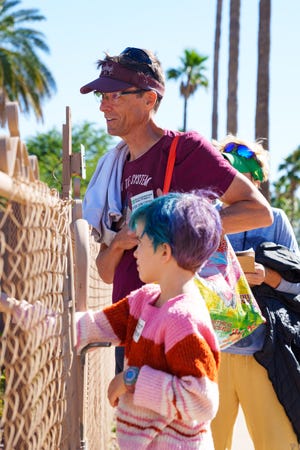
They crossed South Treat Ave and approached a chain-link fence with a man named Jesus standing in the driveway behind. He said he had received his ballot in the mail, but hadn't sent it back in yet. Sipp wrote down some information for him on where he could drop it off if he doesn't get it in the mail by the recommended Nov. 1 deadline, as well as a website where he can find out more about voting, vote411.org.
An hour later, back at Ramada 22, somebody points out another male vermillion flycatcher. It's small, quiet, and boldly-colored like Everest, with fire-colored red feathers on its head and chest that seem a little too brilliant to have occurred naturally. He's a marvel, someone else says, an inspiration, and the adopted mascot of Tucson birders.
Joan Meiners is the Climate News and Storytelling Reporter at The Arizona Republic and azcentral. Before becoming a journalist, she completed a doctorate in Ecology. Follow Joan on Twitter at @beecycles or email her at joan.meiners@arizonarepublic.com.
Support climate coverage and local journalism by subscribing to azcentral.com at this link.
This story is dedicated to Zelma Marie Brewer, who loved camping in nature and was soft-spoken but hilarious. She passed on Oct 30, 2022 at the age of 93.
